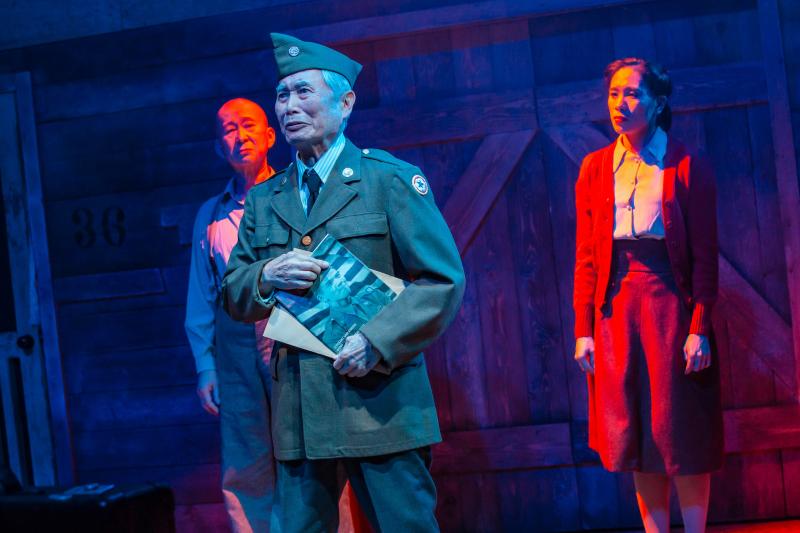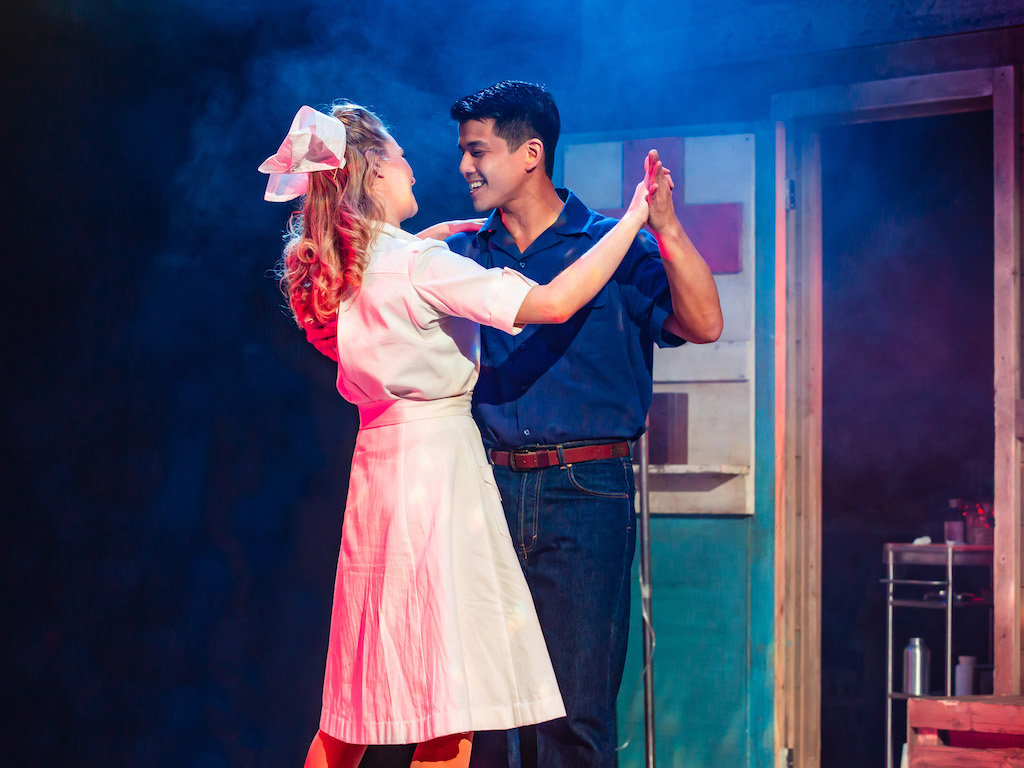Allegiance, Charing Cross Theatre review - George Takei's childhood story makes a heartfelt musical | reviews, news & interviews
Allegiance, Charing Cross Theatre review - George Takei's childhood story makes a heartfelt musical
Allegiance, Charing Cross Theatre review - George Takei's childhood story makes a heartfelt musical
Star Trek's Mr Sulu honours fellow Japanese-American survivors of wartime internal exile

Like families, nations have secrets: dirty linen that they prefer not to expose to the light of day. Patriotic myths need to be protected, heroic narratives shaped, good guy reputations upheld. In 1942, the USA rounded up Japanese-Americans and locked them away in the badlands of the Midwest and promptly forgot about them – and then worked hard to keep it that way in the decades that followed. It’s likely you didn’t know that and it’s no accident if so.
One such intern was George Takei – Star Trek’s Mr Sulu and, in his extraordinary second life, liberal activist supreme on social media. Allegiance is his legacy project, his witness statement on behalf of his family and many like them. Pace Hamilton, he lived, he didn’t die and he tells his story.
 In the UK for the first time after a financially unprofitable run on Broadway some seven years ago, the show is billed as an “uplifting” musical, a descriptor that sits better on a Playbill than within a review, but it’s definitely heartfelt, authentic and moving and that’s plenty enough. (It is also, and this is no backhanded compliment in so challenging a venue as the Charing Cross Theatre, technically immaculate: a fine testament to Chris Whybrow’s sound design).
In the UK for the first time after a financially unprofitable run on Broadway some seven years ago, the show is billed as an “uplifting” musical, a descriptor that sits better on a Playbill than within a review, but it’s definitely heartfelt, authentic and moving and that’s plenty enough. (It is also, and this is no backhanded compliment in so challenging a venue as the Charing Cross Theatre, technically immaculate: a fine testament to Chris Whybrow’s sound design).
We open on the unmistakable figure of Takei himself as Sam Kimura, in full fig, medals on breast, on parade for Pearl Harbour Day, a proud veteran of the US Army. An unknown woman turns up to inform him of his sister’s death and we learn that they have been estranged for 50 years. Soon we go back to the events of the 40s to discover why the soldier pledged himself to the USA and not to his family - in other words, the specifics of his allegiance.
Telly Leung (pictured above with Megan Gardiner) brings a Broadway leading man's high wattage to the starring role of the young Californian Sam, singing in a crystal clear tenor, full of the certainty of youth and love for the country of his birth. Those simple beliefs are tested when his community is despatched to a dusty horse-racing track in Wyoming, treated as enemy aliens when they are neither and, in the language of today, relentlessly othered.
Sam sticks to his guns, and later carries one in the USA’s bloody campaign in Italy, earning a Purple Heart for bravery even as his community is split back home. His sister, Kei (played by Aynrand Ferrer, possessor of one of the sweetest voices, if not first names, in the West End right now), falls for college boy, Frankie (Patrick Munday), one of the more radical of the camp’s resistors, a man who believes that non-cooperation – especially with the demeaning questionnaire designed to determine levels of allegiance – is the best way to gain freedom. Sam and Kei’s father (Masashi Fujimoto) resists the same form, but, for him it’s a question of honour being impugned by his adopted country.
As Sam fights in Europe, tensions play out at home. We note the decency of his blonde bombshell sweetheart Nurse Hannah (Megan Gardiner), chuckle at the humour of his grandfather (Takei himself, doubling roles) and get reminders from a brutal guard (Mark Anderson) that this is not exactly Club 18-30.
The book is credited to Marc Acito, Jay Kuo and Lorenzo Thione and it’s not without its flat spots, but director and choreographer, Tara Overfield Wilkinson, who enjoys a ten year, transatlantic connection with the show, sustains the pace and moves her cast round the traverse stage so as to keep eyelines clear and lighting unobtrusive.
Kuo’s score has elements of traditional Japanese music filtering through an often generic set of melodies, but it’s good to hear a wartime touch provided by a bit of big band swing, a standout 11 o’clock number for Ferrer (‘Higher’) and a nice meet-cute song for Leung and Gardiner (‘I Oughta Go’). If Kuo can’t quite find a showstopper tune, his lyrics are often warm and witty and push the plot forward more successfully than much of the dialogue (inevitably a little heavy on exposition) and, importantly, we hear every word since they are sung magnificently.
As Takei himself proves, the victims of the cruel, racist policy of corralling Japanese-Americans into the most basic of internment camps far from home, was not as catastrophic as was the displacement of so many in World War II’s European theatre, but that relatively benign outcome, and the guilt felt by the Americans who knew about their very own camps – FDR signed the order no less – buried the ugly truth for far too long. Financial compensation was decades coming, but Takei now has some emotional compensation in his taking the show beyond his homeland.
Moreover, and one imagines that this is just as important to the man himself, he invites us to consider the displaced millions of 21st century conflicts and to offer a hand that can help them up and not just the malign finger pointing them to Rwanda, the UK’s contemporary version of a Wyoming racetrack.
rating
Explore topics
Share this article
Add comment
The future of Arts Journalism
You can stop theartsdesk.com closing!
We urgently need financing to survive. Our fundraising drive has thus far raised £49,000 but we need to reach £100,000 or we will be forced to close. Please contribute here: https://gofund.me/c3f6033d
And if you can forward this information to anyone who might assist, we’d be grateful.

Subscribe to theartsdesk.com
Thank you for continuing to read our work on theartsdesk.com. For unlimited access to every article in its entirety, including our archive of more than 15,000 pieces, we're asking for £5 per month or £40 per year. We feel it's a very good deal, and hope you do too.
To take a subscription now simply click here.
And if you're looking for that extra gift for a friend or family member, why not treat them to a theartsdesk.com gift subscription?
more Theatre
 A Moon for the Misbegotten, Almeida Theatre review - Michael Shannon sears the night sky
Rebecca Frecknall shifts American gears to largely satisfying effect
A Moon for the Misbegotten, Almeida Theatre review - Michael Shannon sears the night sky
Rebecca Frecknall shifts American gears to largely satisfying effect
 Burlesque, Savoy Theatre review - exhaustingly vapid
Adaptation of 2010 film is busy, bustling - and bad
Burlesque, Savoy Theatre review - exhaustingly vapid
Adaptation of 2010 film is busy, bustling - and bad
 Don't Rock the Boat, The Mill at Sonning review - all aboard for some old-school comedy mishaps
Great fun, if more 20th century than 21st
Don't Rock the Boat, The Mill at Sonning review - all aboard for some old-school comedy mishaps
Great fun, if more 20th century than 21st
 The Estate, National Theatre review - hugely entertaining, but also unconvincing
Comedy debut stars Adeel Akhtar, but is an awkward mix of the personal and the political
The Estate, National Theatre review - hugely entertaining, but also unconvincing
Comedy debut stars Adeel Akhtar, but is an awkward mix of the personal and the political
 That Bastard, Puccini!, Park Theatre review - inventive comic staging of the battle of the Bohèmes
James Inverne enjoyably reconstructs the rivalry between Puccini and Leoncavallo
That Bastard, Puccini!, Park Theatre review - inventive comic staging of the battle of the Bohèmes
James Inverne enjoyably reconstructs the rivalry between Puccini and Leoncavallo
 Till the Stars Come Down, Theatre Royal Haymarket review - a family hilariously and tragically at war
Beth Steel makes a stirring West End debut with her poignant play for today
Till the Stars Come Down, Theatre Royal Haymarket review - a family hilariously and tragically at war
Beth Steel makes a stirring West End debut with her poignant play for today
 Nye, National Theatre review - Michael Sheen's full-blooded Bevan returns to the Olivier
Revisiting Tim Price's dream-set account of the founder of the health service
Nye, National Theatre review - Michael Sheen's full-blooded Bevan returns to the Olivier
Revisiting Tim Price's dream-set account of the founder of the health service
 Girl From The North Country, Old Vic review - Dylan's songs fail to lift the mood
Fragmented, cliched story rescued by tremendous acting, singing and music
Girl From The North Country, Old Vic review - Dylan's songs fail to lift the mood
Fragmented, cliched story rescued by tremendous acting, singing and music
 The Merry Wives of Windsor, Shakespeare's Globe review - hedonistic fizz for a summer's evening
Emma Pallant and Katherine Pearce are formidable opponents to Falstaff's buffoonery
The Merry Wives of Windsor, Shakespeare's Globe review - hedonistic fizz for a summer's evening
Emma Pallant and Katherine Pearce are formidable opponents to Falstaff's buffoonery
 Run Sister Run, Arcola Theatre review - emphatic emotions, overwrought production
Chloë Moss’s latest play about the different lives of two sisters is deeply felt
Run Sister Run, Arcola Theatre review - emphatic emotions, overwrought production
Chloë Moss’s latest play about the different lives of two sisters is deeply felt

Comments
A visibly frail George Takei